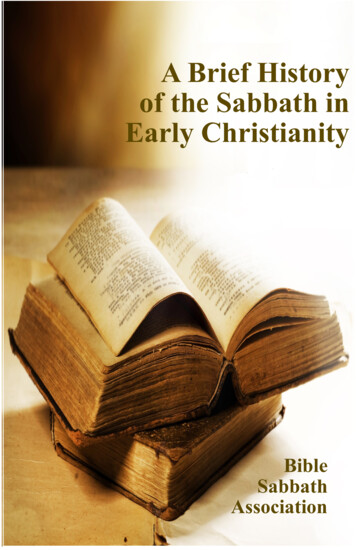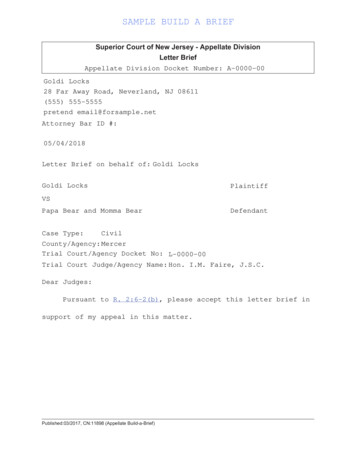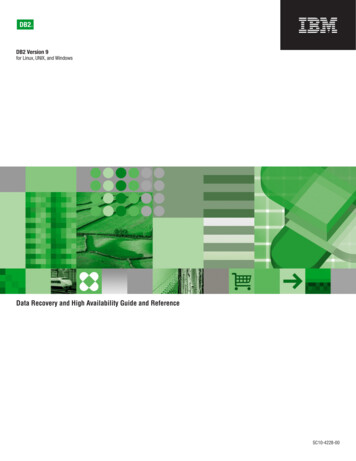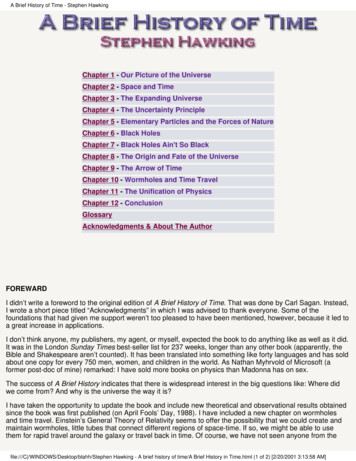
Transcription
A Brief Historyof the Sabbath inEarly ChristianityBibleSabbathAssociation
A Brief History of theSabbathin Early ChristianityBible Sabbath AssociationWritten by Kelly McDonald, Jr. for thebenefit of the Bible Sabbath Association.
Special thanks to Calvin Burrell for proofreading thiswork.1st Ed– April 2019All language references come from Strong’s Concordance.Strong, James.All Bible references come from the King James Version.No part of this work may be reproduced or republished withoutexpress written consent of the Bible Sabbath Association. It maybe freely shared electronically in its original form without editing.All rights reserved. Copyright Kelly McDonald, Jr.4
Table of ContentsIntroduction . 6A Brief Overview of the Sabbath in theNew Testament . 7Seven Factors that Influenced the Sabbathin the Early Church. 12Quotes of Sabbath Keeping in the 300s/400s AD . 28More BSA Resources on Sabbath History . 32Bibliography . 335
IntroductionMost people who attend church in today’s world do so on Sundays. In contrast, the earliest followers of Christ honored the seventh-day Sabbath and continued meeting on that day, according tothe New Testament.To explain this discrepancy, the following arguments are commonly used: The Sabbath was given to Jewish people, not toChristians Jesus resurrected on Sunday, therefore the Sabbath was changed The early church changed Sabbath to Sunday as the gospel wentto GentilesWhat is the truth about this matter, and how can we find it?John Laux, an author of textbooks for Catholic schools, wrote: “Ifwe consulted the Bible only, we should still have to keep holy theSabbath Day, that is, Saturday, with the Jews, instead of Sunday ” (Laux, p 51).John Gibbons, a Catholic Church Cardinal, wrote: “But you mayread the Bible from Genesis to Revelation, and you will not find asingle line authorizing the sanctification of Sunday. The Scriptures enforce the religious observance of Saturday, a day whichwe never sanctify” (Gibbons, pp 72-73).So what happened to the Sabbath? Why don’t more people whofollow Jesus Christ observe it today? To answer this, we must goback to the first few centuries of Christian faith. Several factors inthat era made a long-term impact on Christianity and its view ofthe seventh-day Sabbath.6
Chapter 1A Brief Overview of the New TestamentThe New Testament is vital to our understanding of early Sabbathhistory. In it, we learn about the practices and teachings of ourSavior Jesus Christ. He passed on these teachings and His way oflife to the apostles and other early disciples, who then spreadthem to abroad.What do these teachings and practices contribute to the discussionof the Sabbath? We begin our examination of this question byreviewing the life of Christ.“14 And Jesus returned in the power of the Spirit into Galilee:and there went out a fame of him through all the region roundabout. 15 And he taught in their synagogues, being glorified ofall. 16 And he came to Nazareth, where he had been brought up:and, as his custom was, he went into the synagogue on the sabbath day, and stood up for to read” (Luke 4:14-16).When Jesus Christ came to earth, it was His custom or routinepractice to honor the Sabbath. Several more examples of His Sabbath observance are also found in the Gospel accounts (see Matthew 12:1-8; Mark 3:1-5, 6:1-6; Luke 13:10-17, 14:1-35; John 5:5-18).In Mark 2:27, 28, Jesus also declared Himself Lord of this specialday: “And he said unto them, The Sabbath was made for man,and not man for the Sabbath. Therefore the Son of Man is Lordalso of the Sabbath.”Christ is Lord of the Sabbath – the only day of the week giventhis special designation. In this statement, Christ also affirmedthat the Sabbath was made for all mankind – not solely for Jewsor Israelites. It was established in Genesis 2:1-3, long before Godcalled Abraham’s seed as a distinct nation to Himself.7
Christ practiced and taught only those things He learned from HisFather (John 5:18-19, 8:28). Thus, His life is the model of perfection. Peter, one of the first disciples, said of Him: “Who did nosin, neither was guile found in his mouth” (I Peter 2:22). Jesusnever transgressed any of God’s commandments or taught othersto break them.During His earthly ministry, Christ instructed His disciples to follow His example. “Then said Jesus unto his disciples, If any manwill come after me, let him deny himself, and take up his cross,and follow me” (Matthew 16:24). He set the example for us inteachings and practice.After His resurrection, Christ exhorted the disciples to continue inHis teachings and share them with others. “19 Go ye therefore,and teach all nations, baptizing them in the name of the Father,and of the Son, and of the Holy Ghost: 20 Teaching them to observe all things whatsoever I have commanded you: and, lo, Iam with you always, even unto the end of the world.Amen” (Matthew 28:19-20, emphasis mine).The book of Acts is another chief resource for us to learn the activities of the first disciples. In this precious book, we learn theirtrials and triumphs as they spread the message of Christ to different regions. As we read of their travels, another major questionregarding this subject will be answered: Did the resurrection ofJesus change the Bible’s view of the Sabbath? Their example andteachings will indicate their views on the Sabbath after the resurrection. We begin our brief examination in Acts chapter 13.“Now when Paul and his company loosed from Paphos, theycame to Perga in Pamphylia: and John departing from them returned to Jerusalem. But when they departed from Perga, theycame to Antioch in Pisidia, and went into the synagogue on theSabbath day, and sat down. And after the reading of the law andthe prophets the rulers of the synagogue sent unto them, saying,Ye men and brethren, if ye have any word of exhortation for thepeople, say on” (Acts 13:13-15)In this passage the Apostle Paul and the believers with him arrived at Pisidian Antioch in a region called Galatia. Paul later8
wrote his letter of Galatians to the churches in this region. Theverses above clearly show that Paul met on the Sabbath day.When asked by the leader of the synagogue to teach, Paul’s message comes to focus in these verses.“And though they found no cause of death in him, yet desiredthey Pilate that he should be slain. And when they had fulfilled allthat was written of him, they took him down from the tree, andlaid him in a sepulchre. But God raised him from the dead: Andhe was seen many days of them which came up with him fromGalilee to Jerusalem, who are his witnesses unto the people” (Acts 13:28-31).The central theme of Paul’s message was the suffering, death, andresurrection of Christ. In this message Paul did not mention theresurrection as having any influence on Sabbath observance.What about the people who heard the message? Did they interprethis sermon on the resurrection in such a way that would affecttheir view of the seventh day?“And when the Jews were gone out of the synagogue, the Gentiles besought that these words might be preached to them thenext Sabbath. Now when the congregation was broken up, manyof the Jews and religious proselytes followed Paul and Barnabas:who, speaking to them, persuaded them to continue in the graceof God. And the next Sabbath day came almost the whole citytogether to hear the word of God. But when the Jews saw themultitudes, they were filled with envy, and spake against thosethings which were spoken by Paul, contradicting and blaspheming. And when the Gentiles heard this, they were glad, and glorified the word of the Lord: and as many as were ordained to eternal life believed” (Acts 13:42-45, 48).After hearing the message of Jesus’ resurrection, the Gentiles besought or begged to hear more about Jesus on the next Sabbath.They didn’t ask for a Sunday service; no reference Sunday wasmade. Their response clearly demonstrates that no connection exists between the resurrection message and Sabbath being changed.Thus, verse 42 refutes another commonly held myth that the Sabbath was altered for Gentiles. Other details can be gleaned fromthese verses, however.9
In verse 43, Paul taught them to continue in the grace of God. Inverse 44, he taught both Jews and Gentiles on the Sabbath. Hetaught them about grace and it reinforced their Sabbath observance. This supports the view that grace and law are not contradictory concepts, but mutually supportive ones instead. Gentiles were present and believed in Christ.“Now when they had passed through Amphipolis and Apollonia,they came to Thessalonica, where was a synagogue of the Jews:And Paul, as his manner was, went in unto them, and three Sabbath days reasoned with them out of the scriptures, Opening andalleging, that Christ must needs have suffered, and risen againfrom the dead; and that this Jesus, whom I preach unto you, isChrist. And some of them believed, and consorted with Paul andSilas; and of the devout Greeks a great multitude, and of the chiefwomen not a few” (Acts 17:1-4).These verses tell us that Paul preached in the city of Thessalonica,in Greece. Here again we learn that Paul’s custom was to explainthe Scriptures to gathered groups on the Sabbath. Among his audience in the synagogue were Jews and Greeks. A larger numberof Greeks believed in Jesus that day than the Jewish people. Theresurrection of Jesus was the main content of Paul’s message; theSabbath remained unchanged.The early disciples often met in synagogues because they wereknown to be about the only place that God-fearing Gentiles couldhear the written Word of God in the first century. Written copiesof the Old Testament were expensive and the New Testament wasnot yet written and available.If the resurrection of Jesus had the impact of changing the Sabbath of Creation and of Christ to Sunday, then why wouldn’t theearly Christian church receive and spread that aspect of the message? Keep in mind – not a single verse in the New Testamentlinks the resurrection of our Lord to a change in the Sabbath.Since this content was not addressed at all in the New Testament,then the authors never intended to convey any change to Sabbathobservance.When we hear the reasons why people think the Sabbath has beenchanged or is no longer relevant, none of these reasons are found10
in the New Testament. Many of these arguments are not new;they were first formed in the first few centuries after Christ. Aswe study, we will gain a better grasp on Sabbath history and howto defeat arguments against God’s holy seventh day.11
Chapter 2Seven Factors that Influenced the Sabbath in theEarly ChurchHistory will help us understand the factors that influenced theSabbath in early Christianity. There are at least seven of them thatI have identified. While these items are certainly interrelated, theycan also be viewed individually. These factors are listed below:1) Persecution of Christians2) Destruction of Jerusalem (twice)3) Quartodeciman Controversy4) Anti-Semitism5) Syncretism6) Allegorizing of Scripture7) Rome’s Relationship to Roman EmperorsA series of persecutions affected the Sabbath in the early Church.From 64 AD to 324 AD, Roman Emperors or their magistratesinitiated several persecutions against Christians. Believers hadtheir property confiscated; they were tortured and even killed.Many church leaders were targeted in these attacks. In some cases, the goal was the complete extermination of Christianity.In 64 AD, Nero became the first Emperor to lead such a persecution. Some background information will help us understand howit came about. He desired to build a new city called Neronia(named after himself). Before he could start this project, part ofthe old city of Rome had to be destroyed. Sometime after he expressed this desire, a massive fire destroyed part of the old city ofRome. Some sources record that he purposefully set fire to thecity to make room for his new project.After the fire, the Roman people demanded that the implementerof this crime be revealed. In their minds, someone had to pay the12
price. To divert the people’s suspicion from himself, Nero blamedChristians. Believers were tortured in awful ways to appease theblood lust of the Roman people. Tacitus, a Roman historian wholived near this event, wrote about their awful treatment:“ Consequently, to get rid of the report (that he started the fire),Nero fastened the guilt and inflicted the most exquisite tortures ona class hated for their abominations, called Christians by the populace. Christus, from whom the name had its origin, suffered theextreme penalty during the reign of Tiberius at the hands of oneof our procurators, Pontius Pilate. Accordingly, an arrest wasfirst made of all who pleaded guilty; then, upon their information,an immense multitude was convicted Mockery of every sortwas added to their deaths. Covered with the skins of beasts, theywere torn by dogs and perished, or were nailed to crosses, or weredoomed by the flames and burnt, to serve as a nightly illumination, when daylight had expired . Nero offered his gardens forthe spectacle, and was exhibiting a show in the circus, while hemingled with the people in the dress of a charioteer or stood alofton a car. Hence, even for criminals who deserved extreme andexemplary punishment, there arose a feeling of compassion; for itwas not it seemed, for the public good, but to glut one man’s cruelty, that they were being destroyed” (Tacitus, The Annals,15:44).This account by Tacitus is among the first historical documentsoutside of the Bible that references Christianity. Great harm wasdone to believers, but they pressed on to the high calling of thefaith.As oppressions continued under later rulers, two classes of peoplebegan to emerge in Christianity. The first class was composed ofloyal and faithful believers who held firmly to the faith no matterthe threats against them. The second class publicly professedChrist but denied Him when threatened with punishment. Thissecond class even sacrificed to the pagan gods of Rome.One eyewitness of this development was Pliny the Younger. Hewas a magistrate during the reign of the Roman Emperor Trajan,who ruled from 98-117 AD. Pliny wrote a letter to the Emperordescribing the result of the persecutions that occurred during hisreign. A quote from him is found below:13
“ An anonymous information was laid before me containing acharge against several persons, who upon examination deniedthey were Christians, or had ever been so. They repeated after mean invocation to the gods, and offered religious rites with wineand incense before your statue (which for that purpose I had ordered to be brought, together with those of the gods), and evenreviled [cursing] the name of Christ: whereas there is no forcing, it is said, those who are really Christians into any of thesecompliances: I thought it proper, therefore, to discharge them Some among those who were accused by a witness in personat first confessed themselves Christians, but immediately afterdenied it; the rest owned indeed that they had been of that number formerly, but had now (some above three, others more, and afew above twenty years ago) renounced that error. They all worshipped your statue and the images of the gods, uttering imprecations at the same time against the name of Christ They affirmedthe whole of their guilt, or their error, was, that they met on astated (fixed) day before it was light, and addressed a form ofprayer to Christ I forbade the meeting of any assemblies .For it appears to be a matter highly deserving your consideration,more especially as great numbers must be involved in thedanger of these prosecutions In fact, this contagious superstition is not confined to the cities only, but has spread its infectionamong the neighbouring villages and country. Nevertheless, itstill seems possible to restrain its progress. The temples, at least,which were once almost deserted, begin now to be frequented;and the sacred rites, after a long intermission, are again revived From all this it is easy to conjecture what numbers mightbe reclaimed if a general pardon were granted to those who shallrepent of their error ” (Letter 97; emphasis mine throughout)This primary source illustrates the long-term effect of persecutionthat we previously described. Some people were accused of beinga Christian and at first admitted the charge against them. Whenconfronted, they denounced their profession of faith. Pliny alsonoted that the pagan temples were almost empty, but the persecutions caused them to be full again. In other words, a significantnumber of people who attended Christian meetings later turnedback to pagan worship. This behavior was repeated in subsequentpersecutions, such as Decius in 250 and Diocletian in 303 AD.14
In the quote from Pliny, accused Christians were observed tomeet on a stated or fixed day; this would have been the Sabbath(as we discussed in the last chapter). Such assemblies were forbidden by Pliny. Many of the strongest leaders and believers weremartyred in these persecutions.A second influence on the Sabbath in early Church history wasthe destruction of Jerusalem, which occurred twice. In the book ofActs, we learn that Jerusalem was the primary center of Christianity. The book of Acts mentions this city third-most of all books inthe Bible. Within the city of Jerusalem, councils were held, ministers reported to the Apostles, and ministers were sent out to helpothers. For some examples of this, see the following verses: Acts1:4-8, 11:1-2, 11:19-22, 11:26-27, 12:24-25, 13:13, 15:2, 16:4,and Gal. 2:1-2.In 70 AD, the Romans besieged Jerusalem. The city was ransacked, and the Second Temple was toppled. This was a tragedyfor the Jewish people; it also scattered some Christians. Aboutforty years before, Jesus warned the first believers to flee to themountains when the city was surrounded by armies (Luke 21:2021).Historical accounts record that the early believers listened to Jesus. They fled to a place named Pella and were protected.Epiphanaus and Jerome are two ancient writers that describe thismigration. Of them, Epiphanaus wrote that these early Christiansstill honored the Sabbath (Panarion, Sec. 29; Encyclopedia Brit.11th edition: Nazarenes).While many people today may be familiar with this destruction ofJerusalem, they are usually not familiar with the second siege thatoccurred less than 70 years later.A controversy arose during the reign of the Roman Emperor Hadrian (sometimes called Adrian), who ruled from 117-138 AD.According to the Roman historian Cassius Dio, Hadrian attempted to build a temple dedicated to Jupiter on top of the ruins of theSecond Temple (Book 69, sections 12-14). The Temple was andis the holiest site to Judaism. Hadrian’s decree caused a majorwar with the Jewish people. As many as 585,000 Jewish peoplemay have died in the fighting alone.15
Amid this conflict, Hadrian banned the celebration of the Sabbathand any other practice that appeared to be Jewish. After the Romans conquered Jerusalem, all the Jewish people were bannedfrom city. This caused many Christians (who were Jewish by natural birth) to be removed as well.Eusebius [early 300s AD] wrote: “ until the siege of the Jews,which took place under Adrian, there were fifteen bishops in succession there, all of whom are said to have been of Hebrew descent, and to have received the knowledge of Christ in purity,so that they were approved by those who were able to judge ofsuch matters ” (Eus, History, bk 4, 5:2, [NPNF: 176]).Up to the reign of Hadrian, all the bishops of Jerusalem were ofHebrew descent. Eusebius adds that they all held the knowledgeof Christ in purity. When Jerusalem was destroyed a second time,the headquarters of Christianity was now in question. Over thenext few centuries, other cities competed to be the successor ofapostolic authority and doctrine. These cities included, but are notlimited to: Rome, Alexandria, Carthage, and later Constantinople.This resulted in fragmentation in practice and doctrine.During this epoch, heresies infiltrated Christianity. Hegessipus,who wrote about 150 AD, stated that the church was a virgin untilthe reign of Trajan (Fragments, ANF: 764). Clement of Alexandria, who wrote about 180 AD, asserted that heresies arose in thetime of Hadrian (Stromata, bk 7, ch 17). Sulpicius Severus (400AD) said that until the reign of Hadrian most Christians believedin Christ while obeying the Law of God (Sacred History, bk 2, ch31).From these historical testimonies, we can deduce that during thisgeneral time period – the reigns of Trajan through Hadrian –Christianity began to change, but not for the better.The immediate consequence of the second destruction of Jerusalem was confusion as to when Passover should be celebrated.This is the third factor that had an influence on the Sabbath in theEarly Church. It is also called the Quartodeciman Controversy.The writer Epiphanius documented that that the quarrel about16
Passover started during the reign of Hadrian (Panarion, 70). Upto his reign, there was no confusion about it. Many Christians celebrated Passover on the fourteenth of Nissan, as Jesus commemorated it in this manner.In about 155 AD, a controversy about Passover caused a stir within the Christian world. Polycarp, who was taught and trained bythe first Apostles, was still alive. He celebrated Passover on thefourteenth of Nisan. Anicetus, the Bishop of Rome, refused tofollow the same practice. Polycarp visited Rome to persuade Anicetus to return to the Biblical practice. The early church historianEusebius wrote about this visit.“At this time, while Anicetus was at the head of the church ofRome, Irenæus relates that Polycarp, who was still alive, was atRome, and that he had a conference with Anicetus on a questionconcerning the day of the paschal feast ” (Eusebius, ChurchHistory, bk 4, 14:1- 7).“For neither could Anicetus persuade Polycarp not to observewhat he had always observed with John the disciple of ourLord, and the other apostles with whom he had associated;neither could Polycarp persuade Anicetus to observe it ” (ibid,bk 5, 24:16-17).The meeting between the two leaders came to a standstill. Polycarp held to the practice of Passover as he received it from theearly Apostles. Anicetus decided not to celebrate Passover. Atthat point in history, the Roman Church celebrated Passover onthe Sunday after the 14th of Nisan. They claimed that this practicewas necessary because they believed the resurrection of Jesus occurred on Sunday. This is the first time such a controversy arose;the issue would persist for hundreds of years.How did the Quartodeciman controversy affect the Sabbath?From the position of an annual Sunday celebration to honor theresurrection, the Roman Church drifted towards the view thatevery Sunday should be celebrated by Christians as a replacementof the seventh-day Sabbath. The resurrection became their justification for this practice – even though such a justification is notfound in the New Testament.17
The earliest Apostles met on the Sabbath and taught about theresurrection. This means no justification for Sunday to replacePassover or the Sabbath can be considered apostolic teaching.The message of the resurrection never influenced when the Sabbath was honored in the New Testament (as discussed in the firstchapter).The fourth factor that influenced the Sabbath in the early Churchwas anti-Semitism. It was tightly bound up with the previousthree factors.In the first and second centuries AD, anti-Semitism was prevalentin Roman culture. Some Roman writers called the Jewish peoplea cursed race. They were accused of following mere superstitions;sometimes these attacks specifically targeted the seventh-daySabbath (For a few examples, see Jewish Encyclopedia 1905 article: Seneca, Lucius Annaeus; Tacitus, Histories, book 5:4-5;Quintilian, Institutio Oratia, bk 3, sec 7:21).Unfortunately, anti-Semitism slowly penetrated Christianity. During Hadrian’s reign, a man named Aristides made a defense of theChristian faith to the Emperor. His goal was to curtail regionalpersecutions of Christians in the Roman Empire. In his speechcalled The Apology, he claimed that there were four classes ofmen: barbarians, Greeks, Jews, and Christians. Moreover, heclaimed that Christians were the highest of the four classes andhad the most truth. He claimed that the Jewish people worshipedangels and derived their practices from them. Among the practices he derided was the Sabbath. We have a quote from his workbelow:“Nevertheless they too erred from true knowledge. And in theirimagination they conceive that it is God they serve; whereas bytheir mode of observance it is to the angels and not to God thattheir service is rendered:— as when they celebrate Sabbaths ” (The Apology, Section 14).To my knowledge, this is the first historical reference of a Christian attempting to separate himself from the practices held incommon with Jewish people. But it was the beginning of otherswho would follow with similar arguments.18
Towards the end of Hadrian’s reign, several anti-Semitic teachersspread heresy in the Christian world. Marcion is considered themost influential of them; he began teaching around 144 AD. Hetaught that the God of the Old Testament was a separate Godfrom that of the New Testament. According to Irenaeus, a contemporary of the time, this heretical teacher flourished under theRoman Bishop Anicetus; this is the same Anicetus from theQuartodeciman controversy (Irenaeus. Adversus Haereses. BookIII, Chapter 4, Verse 3).Marcion convinced many people to believe in his heresy (Justin,First Apology, Chapter 26). He had a special hatred for the seventh-day Sabbath. He taught that: “Since that day is the rest of theGod of the Jews, who made the world and rested the seventh day,we therefore fast on that day, that we may not do anything incompliance with the God of the Jews” (Epiphinaus, Panarion,Sec. 42). He advocated fasting on the Sabbath to dishonor the“God of the Jews.”Marcion was declared a heretic by the Roman Church, but theylater adopted some of his teachings. For instance, fasting on theSabbath became a normal practice for the Roman Church by the400s AD (see Augustine – Letters 36, 82).Justin the Martyr was another anti-Semitic writer of this period(150s-160s AD). Justin claimed that the Sabbath was given to theJewish people due to their transgressions and hardness of hearts(Dialogue with Trypho, Chapter 18). These words are in directcontradiction to the words of Christ. Our Lord said that the Sabbath was given for all mankind, not just the Jewish people (Mark2:27-28). It was also first given in Genesis, which was long before the Israelites became a nation. Justin claimed that Christianswho observed practices such as the Sabbath would “probably besaved” (ibid, 47).The anti-Semitism that penetrated Christianity during the secondcentury increased over time; at times it specifically targeted theSabbath. Roman Catholic writers thought they could denigrate theSabbath by labeling it as a Jewish institution. In the late 300s AD,Augustine called people who honored the Sabbath “sons of thebondwoman” (letter 36, chapter 2). Around 600 AD, Pope Gregory called Sabbath keepers preachers of the anti-Christ (Registrum19
Epistolarum, Book 13, Letter 1). This demeaning attitude towards Sabbath observance was designed to scare people awayfrom it.Amid these events, a fifth factor gradually developed: syncretism.Syncretism occurs when someone takes practices from the HolyBible and mixes them with practices from other religions.As some early Christians sought to avoid practices that appearedJewish, they embraced practices from other religions. Sundayworship was one of them. Clement of Alexandria was an influential writer of the late second century. In his writings, we find thefirst indisputable reference to Sunday being called the Lord’sDay. His justification for this view comes from Plato and thenumber eight (Stromata, 5, 14). Plato was a heathen philosopher.Why would anyone use his writings to explain any Christian practice?As the Old Testament was being devalued as the backgroundsource to the New Testament, these Gnostic writers used othersources for an historical background. Greek philosophy was onebelief system syncretized with the New Testament to fill thisvoid.The theology of Clement was sometimes confusing and not always consistent. He was an avowed gnostic and claimed that thetrue gnostic does not honor specific days (ibid, 6:15, 7:7). Amonghis other questionable statements, he proposed that philosophywas given to the Greeks to guide them towards righteousness(ibid, 1:5). He believed that we should pray with our faces towards the east to face the rising sun (ibid, 7:7). Lastly, he believed that the sun was created as an object of worship. “And hegave the sun, and the moon, and the stars to be worshipped ” (ibid, 6:14).The second writer to review as it relates to syncretism is Tertullian. He was a writer who lived in the late 190’s and early 200’sAD. He was an avowed enemy of Marcionites, but he still advocated Sunday worship. I have included some of his quotes below.“Others with a greater show of reason take us for worshippers ofthe sun This suspicion took its rise from hence, because it was20
observed that Christians prayed with their faces towards the east[towards the sun] but if we, like them[the pagans], celebrateSunday as a festival and day of rejoicing, it is for a reason vastly distant from that of worshipping the sun; for we solemnize theday after Saturday in contradistinction to those who call thisday their Sabbath, and devote it to ease and eating, deviatingf
Early Church History will help us understand the factors that influenced the Sabbath in early Christianity. There are at least seven of them that I have identified. While these items are certainly interrelated, they can also be viewed individually. These factors are listed below: 1) Pers











